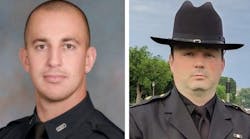Columbus Police Officer Gregory Stevens was trying to reconcile with his former girlfriend when he illegally searched for information about her new boyfriend on a confidential police database, an internal investigation found.
The division filed internal charges against Stevens in 2007 for unbecoming conduct and untruthfulness. Investigators determined that he had harassed or stalked his ex-girlfriend even after she sought a protection order against him, which they noted is a fourth-degree felony.
The city tried to fire him, mainly for lying during the investigation, but he won his job back on an appeal through a third-party arbitrator.
The city's public-safety officials consider lying to be a cardinal sin for officers. They say it should almost always result in termination.
But officers don't always lose their jobs for being untruthful, and until recently, the city didn't keep track of those who lie and stay on the force. The lack of oversight has allowed some dishonest officers to receive promotions. Officials say they probably have testified in criminal cases without disclosing the transgression, a violation of federal and state law.
It wasn't until last year that the Police Division created a list of untruthful cops. The Dispatch obtained the list under the Ohio Open Records Act. Police Chief Kimberley Jacobs said she is reviewing the list, which was put together before she was named the division's leader in April.
"Our integrity must be unquestioned, so anybody that damages that integrity by being untruthful is looking at the loss of their position," Jacobs said. "I can't say strongly enough how extremely important it is to maintain our integrity with the public."
That's why Jacobs pushed for and got the city's police union to agree in its latest contract that she can use the list when considering existing and future job assignments.
More important, the city now can retain any record of untruthfulness for an officer's entire career. Previously, the record was destroyed after six years.
Jacobs insisted that the list will not be used for progressive discipline.
Jim Gilbert, president of the police union, said the city's list exists because law-enforcement agencies are required to notify prosecutors or courts when an officer has knowingly lied.
The requirement is part of a nearly 50-year-old U.S. Supreme Court decision in the Brady v. Maryland case that the court has continually updated to force notification from reluctant police departments trying to protect their images.
Gilbert said the union agreed to allow Jacobs to use the list to better track officers who are dishonest because it is the right thing to do.
"We agree with its purpose and the reasoning behind why it's important to have the list," Gilbert said. "Some of these situations are not clear-cut and involve a lot of he-said she-said stuff, and it can ruin a young career, so this is a very sensitive issue for our members."
Most of the 15 officers on the list and still on the force were unaware that such a record exists. Columbus has about 1,900 officers, so fewer than 1 in 125 are on the list.
Because Jacobs said some names should not be on the list and the division has not retained investigation records related to those officers, The Dispatch is not publishing all the names.
However, six officers on the list have records of sustained charges, and both the union and public-safety officials agree that they belong on the list.
Stevens is on the list twice for separate instances of untruthfulness, though the records related to the other incident in 2002 were destroyed under prior retention policies.
He did not respond to requests for comment.
Sgt. Steven Tarini doesn't think his name should be on the list.
He was fired in 2009 after explaining to supervisors that he did not photograph the buttocks of a man he stunned with a Taser, according to police documents. Officers are required to photograph where prongs from the Taser lodge in a person as long as it is not a "sensitive area."
An internal investigation determined that Tarini knew the man's buttocks were in the photo and that he knowingly made an untrue statement.
Tarini appealed his termination, and in January 2010, an arbitrator found that the city did not have cause to fire him.
The arbitrator said there was no "demonstrable evidence that he was untruthful" and that the officer's photo included the upper hip. The arbitrator did note that Tarini's statement was "self-serving, misleading and not forthcoming."
"The arbitrator ruled that (the city) did not meet the burden of proof," Tarini said. "My case is so minor and this list, well, it's very serious and is not something I should be on because there was no justifiable reason for the untruthfulness charge."
Police and union officials said an arbitrator's ruling does not void an internal-affairs investigation or its findings.
Officer Joseph Hern admits that he was wrong for involving himself in a high-speed chase in 2008 and that he circumvented the division's procedures.
But he insists that he was truthful.
Hern and his partner, Officer Joshua Daugherty, were each charged with criminal misconduct and untruthfulness for involving themselves in a high-speed pursuit in March 2008. Both officers received six-week suspensions.
The investigation found that the officers purposely switched radio frequencies to avoid hearing orders to not pursue a fleeing armed robber, according to police documents. The fleeing suspect crashed.
The two officers can be overheard on their cruiser's recorder having a conversation that investigators said was evidence that "they knew they were violating policy when they engaged in the pursuit."
"I am embarrassed about what happened, and I knew I was circumventing the process, but I was not untruthful," Hern said. "Things happen fast when you're in the moment, and in no way was I concocting a defense; I was just trying to tell the events as I remembered them."
Daugherty did not respond to requests for comment.
Officer Barry Hall was fired in 2009 for lying about an off-duty incident involving a woman who said she had been sexually assaulted, according to police records. The division's sex-crimes unit found no evidence that the woman had been assaulted but determined that Hall had lied when he said the woman was not in his apartment on a certain date.
Investigators also determined that Hall had driven his personal vehicle while under the influence of alcohol, a violation of the division's rules of conduct.
Hall got his job back when an arbitrator ruled that the city did not have sufficient grounds to terminate him.
Hall did not respond to requests for comment.
Some officers said they are forced into accepting an untrue charge to keep their jobs or reduce their punishment. They said they were unaware that doing so would land them on a list.
"An officer is supposed to be truthful at all times, and I understand that," said Officer Randall Lyons. "But now it seems if they label you with untruthfulness, you are scarred for the rest of your career. And people need to understand that there is a very gray line here to determine being untruthful, and yet you can be put on this list forever."
Lyons was suspended for 80 hours in 2006 for falsifying applications to be a courtesy officer at two area apartment complexes while off duty. It's common for complexes to hire officers to respond to situations in exchange for free rent.
Lyons told investigators that he falsified his address on one application because he was afraid of getting a bad reference.
Franklin County Prosecutor Ron O'Brien said that, no matter how minor the offense, an officer's credibility is vital in court proceedings and that, in every instance, cities are required to disclose the information no matter the damage to their reputation.
"State and federal courts have made it clear that, if an officer is set to testify, his or her career record can be admissible during a court proceeding," he said. "In many instances, an officer's testimony can be the most-important part of a trial."
Copyright 2012 The Columbus DispatchAll Rights Reserved



